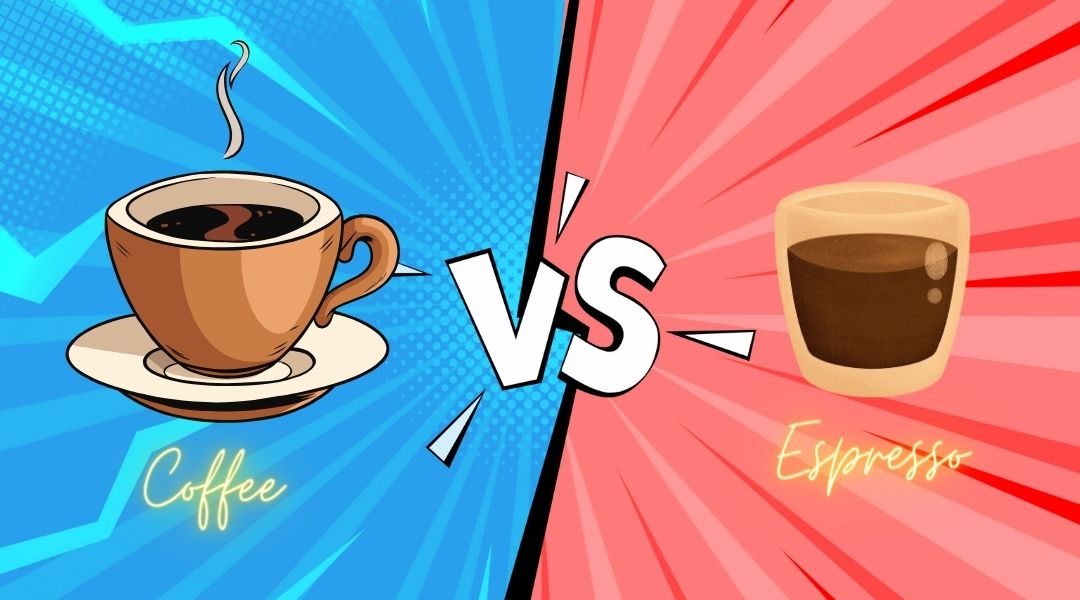
Exploring the Distinctions: Caffeine in Espresso vs. Coffee
The allure of coffee extends beyond its delightful taste, as caffeine plays a pivotal role in the appreciation for this beverage. However, the caffeine levels in coffee can vary, prompting us to question which option, a cup of coffee or an espresso, provides a more potent kick.
Generally, a coffee cup contains more caffeine than an espresso shot. Let us now explore the caffeine levels of these popular drinks and uncover the underlying factors contributing to this disparity.
What is the caffeine content in Espresso?
The caffeine content in your espresso drink is as intriguing as it is variable. Consider the quantity of Espresso consumed and the type of espresso shot, as each can influence the caffeine level in your cup. Let's dive deeper into these factors and unravel the mysteries behind your caffeine fix!
1. Amount of Espresso
A single shot of Espresso contains 64 mg of Caffeine. As you add more Espresso, the caffeine level naturally increases. Popular espresso drinks like lattes and cappuccinos typically have at least two shots of Espresso, resulting in an average caffeine level of around 128 milligrams.
2. Type of Espresso Shot
The caffeine levels in Espresso vary based on the water volume and extraction time. Take ristretto and lungo shots as examples. Ristretto shots extract half the water faster, lowering caffeine content than regular Espresso. On the other hand, lungo shots use double the water and extract over a longer period, resulting in a moderately higher caffeine level than normal Espresso. Understanding these differences is crucial for coffee enthusiasts seeking the perfect cup.
What is the caffeine content in coffee?

The brewing method and the coffee-to-water ratio influence the amount of caffeine in your coffee. On average, an 8 oz cup of black coffee contains around 95 mg of Caffeine. As expected, larger coffee cups have higher caffeine levels. If you prefer a sixteen-ounce travel mug, you'll consume approximately one ninety milligrams of Caffeine - significantly more than a single shot of Espresso!
The Bottom Line
While the caffeine levels in coffee and Espresso can differ, coffee normally has more caffeine. To match the caffeine content in an average 8-ounce cup of coffee, you must take three shots of Espresso. Notwithstanding Espresso's bold and intense flavor, coffee reigns supreme in caffeine. So, when you need an extra energy boost, reach for a cup of black coffee. And if you're searching for a caffeine calculator, try the user-friendly tool.
Frequently asked questions
How much Caffeine is in an espresso shot?
The caffeine content in an espresso shot can differ based on the brewing method and the amount of water in the coffee. Typically, it falls between 64 to 75 mg per portion.
Is Espresso stronger than coffee?
Espresso is known for its higher concentration than regular coffee, resulting in a bolder flavor. Conversely, coffee generally contains more caffeine. To match the caffeine level of an 8-ounce cup of coffee, one must consume three shots of Espresso.
How can I reduce the amount of Caffeine in my coffee?
One method for decreasing the caffeine content in your cup is by incorporating milk or cream into your brew. This action dilutes the caffeine, resulting in a less potent cup. Alternatively, you may opt for decaffeinated coffee beans, which notably reduce the caffeine content in your brew.
Does cold brew have more Caffeine than regular coffee?
Generally speaking, cold brew contains more Caffeine than regular coffee - though the exact amount depends on the brewing method and water-to-coffee ratio used.
Is Caffeine an addiction?
Numerous individuals encounter physical withdrawal symptoms when they decrease their caffeine consumption. However, medical experts do not classify it as a genuine addiction. Nonetheless, excessive caffeine intake can result in dependency. Hence, it is advisable to indulge in moderation.
What are the benefits of drinking Caffeine?
Caffeine is the ultimate ally for alertness and physical performance! It's a focus booster, concentration-sharpener, and fatigue-fighter. Not only that but studies suggest it may even protect cognitive function and memory. But remember, too much caffeine can have downsides, so savor it in moderation for the perfect fetch!
Does Caffeine help with weight loss?
Caffeine, the ultimate energy booster! It enhances focus and motivation, making workouts a breeze. However, let's not forget, it's not a magical weight-loss potion. Excessive caffeine can cause jitters and sleeplessness, which is no fun! So, let's strive for the perfect balance, ensuring a healthy and energized you.
Are there any natural sources of Caffeine?
Yes! Caffeine is naturally present in plants like yerba mate, guarana berries, tea leaves, and coffee beans. You can also find it in some dark chocolate and energy drinks.
Check out Lifeboost Coffee Optimist Light Roast.
- https://drinksupercoffee.com/blog/nutrition/caffeine-in-espresso/
- https://www.mindbodygreen.com/articles/espresso-vs-coffee
- https://coffeeaffection.com/caffeine-in-espresso-vs-coffee/
- References for the article to confirm data and information.







